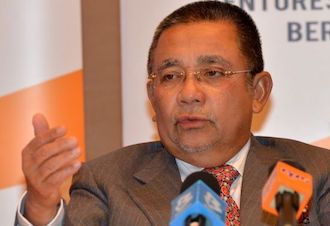Felda comes under fire over ‘expensive’ Indonesian palm deal

(Reuters) – Malaysia’s Federal Land Development Authority (Felda) came under mounting criticism yesterday for its plans to purchase a stake in Indonesian palm oil firm PT Eagle High Plantations Tbk in what critics have called an overpriced deal.
State-owned Felda, which operates some of the world’s biggest palm oil plantations, said on Friday it plans to buy a 37 per cent stake in Eagle High for US$505.4 million (RM2.2 billion).
Based on Reuters calculations, that puts the deal’s value at about 582 rupiah (4 cents) a share, a 95 per cent premium to Eagle High’s Friday closing price.
Criticism from opposition parties and Felda settlers, or small landowners, was swift.
One settlers’ association, the National Felda Settlers’ Children Society (ANAK), asked the government to intervene and stop Felda’s purchase of the Eagle High stake.
“I’m confident it’s not just among ANAK members. A majority or a large number of the Felda community are upset (with the deal),” said ANAK president Mazlan Aliman.
He expressed concern that Felda may have to borrow to finance the stake acquisition, which could affect the settlers, who typically receive some grants from Felda.
Felda settlers are ethnic Malays who receive aid in the form of land from the government. They form a bulk of the vote base in about 50 of 222 parliamentary seats.
Najib, mired in a corruption scandal involving state fund 1MDB, is eyeing elections in the second half of 2017, nearly a year ahead of the 2018 deadline, a government source has told Reuters.
Mazlan said he was worried the deal was made “expensive” for a “personal agenda” and that the association would organise protest rallies if the deal was not called off.
Rajawali Group, which owns a controlling stake in Eagle High, is one of Indonesia’s biggest conglomerates, with companies involved in media, telecommunications, mining and plantations. It is headed by tycoon Peter Sondakh, who has long-standing ties with Malaysian Prime Minister Datuk Seri Najib Razak.
Felda’s main listed unit, Felda Global Ventures Holdings Bhd (FGV), first tried to buy a stake in Eagle High in June 2015 for US$680 million, but scrapped that plan in November after politicians and investors blasted the deal as too expensive.
One reason Felda Group is trying to do the deal through one of its unlisted entities is so it can bypass shareholder approval, sources familiar with the matter said.
“If (Najib) pushes this, he picks a fight not with political parties but with Umno’s largest vote bank,” opposition lawmaker Rafizi Ramli told a news conference on Tuesday, referring to the ruling United Malays National Organisation.
Rafizi said he was confident the deal would be stopped again and that he would work with Indonesian legislators on this.
Valuation questioned
Nazir Razak, the brother of the Malaysian prime minister and chairman of the country’s second biggest bank, CIMB Group Holdings Bhd, also questioned the deal.
“Eagle High’s average price in November was 212 rupiah per share, so a 173 per cent premium for a noncontrol stake,” Nazir said in an Instagram post on Friday. “I hope the board will fully justify the acquisition & valuation even though the deal is no longer made by listed FGV (Felda Global Ventures).”
Felda, in a statement addressing the criticism, said the share price was not the accepted valuation method when it comes to a plantation company and that it should instead be determined by enterprise value per hectare.
Palm oil industry analysts say while this is a justifiable metric for a complete takeover or a controlling stake, it is not justified for minority stakes.
“Felda will not be in the driver’s seat, so this is only an investment for them. From an investment perspective, share price is very much relevant,” said an industry analyst, who did not want to be identified.
In the statement, Felda also said the deal will not impact its existing commitments and programs to improve the well-being of the settlers.

